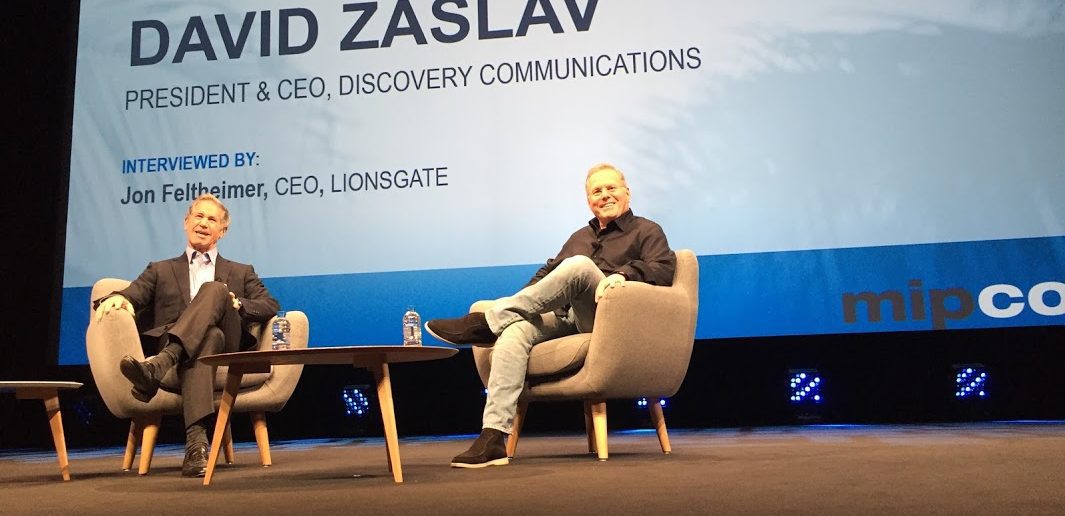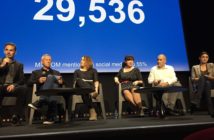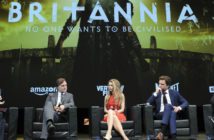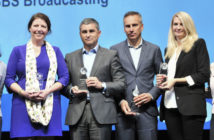This afternoon, Discovery Communications President and CEO David Zaslav was honoured as MIPCOM’s 2017 Personality of the Year. The Q&A was moderated by CEO Jon Feltheimer of Lionsgate, a longtime Discovery partner, at left. Feltheimer notably also won Personality of the Year in 2010.
Since becoming CEO in 2007, Zaslav has transformed Discovery into a global real-life entertainment leader, reaching 3 billion cumulative viewers around the world.
Under Zaslav, Discovery began trading as a public company in 2008 and became a Fortune 500 company in 2014. It recently announced plans to acquire Scripps Networks Interactive, a deal expected to close in early 2018. Together, the two companies will comprise a world-class portfolio of brands and become home to five of the top female networks, delivering over 20% share of women watching primetime in the U.S., nearly 20% of ad-supported pay-TV viewership in the U.S. and over 7 billion streams.
Zaslav has also helped Discovery launch some of the fastest-growing cable networks in the U.S., including Investigation Discovery and OWN: Oprah Winfrey Network, and other channels around the world. And he expanded Discovery’s range of content genres and brands, via investments that include Discovery Kids, the leading pre-school network in Latin America, and through the acquisition of Eurosport, home to the Olympic Games in Europe through 2024. All this without mentioning the digital distribution platforms and content formats he’s encouraged investment in.
With all this in mind, Feltheimer observed, “In the 11 years you’ve run Discovery, the pace of change is faster. You’ve clearly chosen to be a disruptor. What were the core elements in your transformation strategy?”
“When i got to discovery 11 years ago, it was dual revenue stream cable and free-to-air. The only way to consume content was the TV in the living room; we were curating stories to go on that set,” Zaslav said. “It was a hell of a run, an environment where if you were the second or third or fourth choice, you actually did quite well.”
He went on, “Business is still robust, people still primarily consume content on TV … but the business has changed. Now we ask, what will people watch when they watch anything? And what IP do we own long-term?”
Content ownership has thus become critical, which is part of why Discovery chose to acquire Scripps, whose vision aligns with its own: “We’re very IP-long. Scripps owns all its content, whether cooking, HDTV, travel. A lot of that IP hasn’t been taken around the world, so we can launch channels around the world for very little money using their extensive library.”
It’s a unique opportunity: “We’ll be the largest global IP company around the world,” Zaslav said. “The only other company that has global IP is Disney.”
Discovery was historically a non-fiction channel, and a top channel for men. Scripps, on the other hand, has a lot of female-focused content. “We needed to branch out from just non-fiction and be strong in men, women, sport, kids, and we need to own more IP. Today we’re the no. 1 international pay tv company,” Zaslav declared.
Feltheimer also asked what he believes the future of ad-supported TV will be.
“We have channels for superfans—Discovery, Science, Eurosport—that enable us to group audience together,” Zaslav said. “We’re competing now with Facebook and digital platforms, but we have a very safe platform on TV. We have a good measurement system and real safety: Advertising in Europe, Latin America and the US remain quite strong.”
But he cautioned, “We need to step up our analytics. There’s a real opportunity to work with distributors to get more data on who’s watching programmes. The more local data we get, the higher CPM we can get. If we can get better data, we can actually reduce the commercial load. We agree that you can damage the user experience like that.”
Zaslav also feels that curation will be the biggest problem we’ll face in a new world fragmented by platforms. “A basic cable package is really a package of curation,” he observed. “You can have five different tastes in your home; everyone has a few channels they like. 80-100 channels can nourish everyone in the family, and their friends when they come over.”
But bundling needs to be rethought in response to changing consumption habits. “We used to offer all sports for $8, but people would come in for the French Open and leave. They’d say, ‘we didn’t stay because we love tennis’. So we’ve been gravitating toward something we call a season pass. if you love tennis, we’ll give you tennis. Food? We’ll give you food. Science? We’ll give you science. People will pay to watch, or they’ll download on their device and we can sell it.”
Much of what Zaslav is focused on now is unlocking millennials. Discovery content can be found on Facebook as well as Snap, with whom it today announced a deal for Olympics content.
Snap is “an important distribution platform to us,” Zaslav said. “We now have 3-4 Snapchat channels, extensive relationships with Snapchat and Facebook, a great anlaytics group. That led us to doing this deal with Snap, which will be innovative in terms of us telling great stories ourselves, and taking user-generated content from the Olympics and distributing that to reach a much bigger audience and get millennials excited about the Olympic Games.”
Another key focus is advancing Discovery’s value of teaching people about animals and sensitising them to a growing number of extinctions. Notably, Animal Planet will soon launch a show featuring the Irwin family, who are committed to pursuing beloved late animal enthusiast Steve Irwin—a vivid realisation of his hope that his children would take up his mantle.
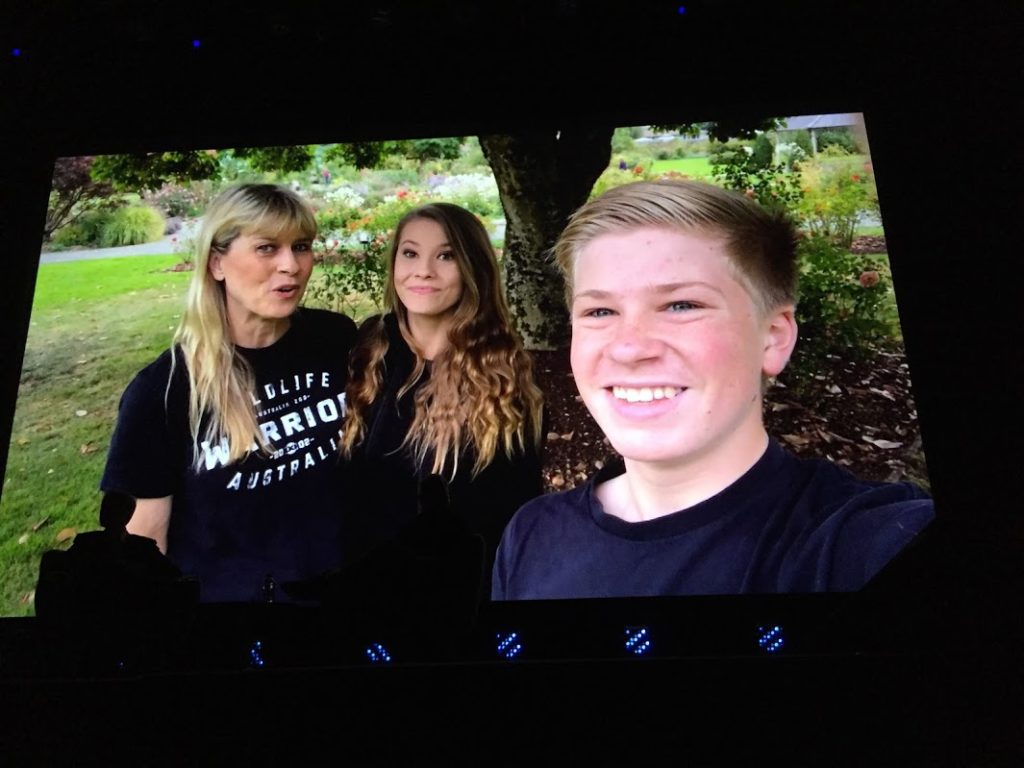
This commitment to animals is “not just animal planet; it’s part of the DNA of Discovery,” Zaslav said, pointing to the network’s documentary, The 6th Extinction, which noted that 20 percent of animals that were roaming earth at his birth are now gone—a figure that will most certainly rise, possibly at a faster rate.
“We have this business called The Dodo, all about animal activism,” said Zaslav. “It’s the largest short-form animal video business, with 2,5 million views a month. Animal Planet is dedicated to it. It’s a series of programmes related to animal extinction, the No. 1 initiative for our company.”
It’s a mission Discovery takes seriously. “We made a decision that spreading the word and engaging people in this mission isn’t enough; we need to do something ourselves,” he said. To do that, Discovery launched Project Cat: There are 3400 tigres left on earth, so the company purchased 2 million acres in India with hopes of doubling that populace, alongside the World Wildlife Federation, by 2022.
“We’re making real progress since initiating the program 1,5 yrs ago,” he added. “It’s about the purpose-driven company we are—not just creating great content and engaging people, but making a difference.”
This mission is of particular importance to himself.
“This is our generation’s rendezvous with destiny,” Zaslav said. “We had this Greatest Generation. what our generation is leaving behind is a challenge. It’s something we’ve dedicated ourselves to.” The legacy left to our grandchildren can’t be a desolate landscape and shame.
 The following keynote came from Dominique Delport, chairman of Vivendi Content and managing director of Havas Group. His job is to lead all the company’s strategic projects around new content, new platforms and new forms of storytelling.
The following keynote came from Dominique Delport, chairman of Vivendi Content and managing director of Havas Group. His job is to lead all the company’s strategic projects around new content, new platforms and new forms of storytelling.
It’s also his job to forge creative links between Vivendi’s various arms: broadcaster Canal+, record label Universal Music Group, mobile games firm Gameloft and video-streaming service Dailymotion included. He also oversaw the launch of premium-shorts app Studio+ this year. Delport gave a speech before being interviewed on-stage by Marjorie Paillon, France 24 journalist and founder of I Love Productions.
He talked about a tale of two cities: free and paid content, and the three battles around it: the eyeballs war, the subs war and the mobile war, as well as the tech giants reshaping the media landscape.
The eyeball wars though? “Yes it’s true: money follows eyeballs… The platforms have started to redesign the world,” said Delport, noting the disruption for music and the print industries. “The bad news is that the same platforms are now going to TV.”
He said 2016 was a tipping point where digital advertising spend ($72bn) outweighed TV advertising spend ($71bn) in the US. And there are just two companies dominating that digital ads growth: Google and Facebook. “This unprecedented duopoly, Google and Facebook, in that free content world, where every content is funded and subsidised by advertising money,” he said.
Delport noted that Google has the best discovery engine, while Facebook has the best targeting engine, backed by a community of 2bn people connected to each other. But he noted that Facebook (2bn), YouTube (1.5bn), WhatsApp (1.2bn) and Facebook Messenger (1.2bn) all have more than a billion active users, with Chinese platform WeChat zooming towards that milestone too at just under 900m.
Delport hailed the development of the ‘stories’ format of social media content, which started on Snapchat. “Today, 40% of these stories are video. Tomorrow, that video will be ad-funded,” he said. “Every platform has a DNA. My belief is that YouTube’s DNA is free,” he continued, noting that YouTube has been trying to grow its subscription revenues from its premium YouTube Red service. Delport’s comments suggested he thinks it is finding that challenging.
 Delport said that the war for eyeballs will be about building new stories, new formats and new games. “You need to create, you need to innovate, you need to crack new formats,” he said, suggesting that “there is still time” for TV companies to do this, in the face of Google and Facebook’s move into ad-funded TV-like content.
Delport said that the war for eyeballs will be about building new stories, new formats and new games. “You need to create, you need to innovate, you need to crack new formats,” he said, suggesting that “there is still time” for TV companies to do this, in the face of Google and Facebook’s move into ad-funded TV-like content.
Delport talked about the pay-TV business, which is under pressure around the world. But he suggested that the path to a brighter future involves ownership of premium properties – HBO being one example – they can launch their own OTT services without having to provide physical boxes.
“You need to be everywhere, you need to be ubiquitous,” said Delport, before moving on to the original content plans of companies like Apple and Netflix. “The original content race has just started. And you can be mesmerised by the amount of money and the ambition of these new players,” he said, before advising TV firms to break free of the hypnosis.
Delport said that the studios have “money and resources to build the future. You just need a new operating system… we are entering into the world of subscription, and it changes everything,” he said, citing music-streaming services as inspiration. “Price the consumer, don’t price the product. It’s all about access and assets. And you need to manage your assets, but you need to find new access.”
60% of US households now have an Amazon Prime membership, added Delport, noting that this is “just the beginning” for Amazon’s ambitions to sell content and services to those people. “Alexa is the next weapon to literally dominate our living room and kitchen. 70% of the voice-assistant market is already owned by Amazon. And when you ask Alexa to buy you batteries, it recommends you to buy… Amazon batteries!… Only a great brand can protect you from the voice disruption.”
Delport talked about mobile, with messaging the most popular activity, and mobile gaming the second most popular. He also talked about the idea of “rewarded UGC” – user-generated content platforms like Live.ly where people broadcast live video, and get rewarded for it by fans through in-app tipping systems.
“Mobile is the entry point for VR and AR,” he added, suggesting that smartphones and non-tethered (to a PC) headsets will finally make these technologies mainstream.
Delport sees the future as being a lot about premium mobile content, as represented by Studio+, which now has five million subscribers for its slate of nearly 50 series, structured in 10-episode series of 10-minute programmes. Soon, it will get the first premium music content, courtesy of Universal Music Group.
“Our future, your future, will not only be about content. It will be about container, it will be about context. The ability to understand what consumers want to watch, and love, and cherish. But also the platform you have to intimately master,” he said. Delport also threw in a future curveball for the way we watch video. “The self-driving car of tomorrow will be your new living room”.
 Enter Marjorie Paillon to drill down more into these topics. “You need to move the discussion with your audience in order to better understand your consumer… respecting privacy… but really being closer,” he said. “It’s not ‘I produce, I ship, I’m done’. That doesn’t really work any more. You need to really understand who you’re talking to.”
Enter Marjorie Paillon to drill down more into these topics. “You need to move the discussion with your audience in order to better understand your consumer… respecting privacy… but really being closer,” he said. “It’s not ‘I produce, I ship, I’m done’. That doesn’t really work any more. You need to really understand who you’re talking to.”
“Storytelling is king… Content is king, of course, but distribution is queen. And we are living in that world where the kings and queens are equal, which is really great news,” he continued.
Delport talked about Havas and Vivendi’s group strategy. “There are many opportunities there. For Havas to have access to Vivendi’s assets, it’s very great for all the brands we represent,” he said. “It creates a unicorn. Now it’s up to us to extract value: value for the fans, value for the artists, value for the advertisers and for the brands. Value for our talents.”
“What people want is to feel emotion, and they want to connect with stuff that matters to them,” he continued. “And I think brands are part of that. Remember, the advertising business is a $600bn business. The money has always been here to subsidise free video, free radio, free print and so on… So I think that we are in a very interesting path. All the team are excited: 40,000 people both sides, and it’s up to us now.”
Delport talked about the challenges around modern advertising. “People are bored with ads. Steve Jobs said ‘advertising sucks’ and it’s one quote I never forget. And why? Because the experience is terrible. Look at mobile advertising: 60% of mobile banner clicks are mistakes. People spend more time trying to find the arrow than watching the ad! We have to fix that,” he said.
“A lot has to be done. Yes, it’s true, we need data. The success of Amazon, the success of Netflix is data-driven, no doubt. And the way we can collect and extract even anonymised data… to understand the consumer. That is at the core.”
Paillon asked about data-collection and privacy legislation that is coming in May in Europe: the General Data Protection Regulation (GDPR). “It says you can’t collect privacy data the same way. And it’s the strictest regulation in the world that will start, and companies can be fined if they don’t comply 4% of their revenues, which is a lot of money,” said Delport.
“We need to build new ways of collecting and rewarding. It’s a trade-off: if you don’t give me something back, don’t expect to have anything from me. But if you understand me more, as a friend, you can provide me better entertainment… Don’t forget, everything starts with content. And if you don’t have the best stories in the world, no data to capture, and no consumers to delight.”

